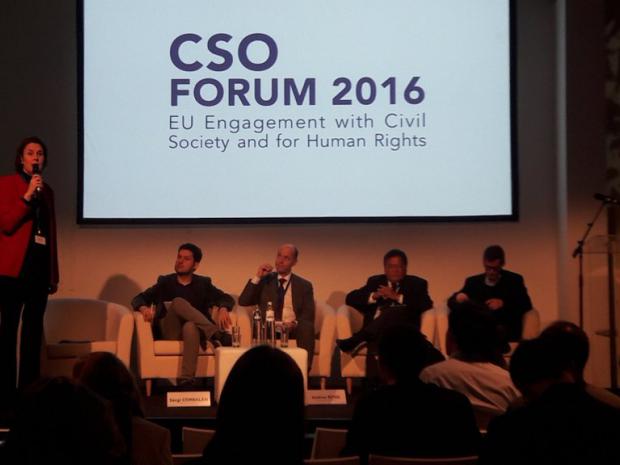Roadmaps pulling local actors at the centre
Discussion details
Pulling local actors at the centre of development is one of the main outcomes after two years Roadmap for EU engagement with Civil Society. Conceived as a direct implementation tool of the Communication 2012 “The Roots of democracy and sustainable development: Europe’s engagement with Civil Society in External Relations” Roadmaps are now playing an important role for the EU to localise engagement with Civil Society.

At the CSO Forum 2016 for EU Engagement with Civil Society and for Human Rights, which was held on 17 and 18 March in Brussels, Maina Kiai, UN Special Rapporteur on the Rights to Freedom of Peaceful Assembly and of Association, emphasised the need to pay more attention to local actors. “Development is best done by local actors and therefore we need to give more credits and more respect to those local actors.”
During a special workshop at the Forum on the EU Country Roadmaps for engagement with Civil Society, Jacques Perrot, DEVCO Roadmaps Coordinator, emphasised that “the Roadmaps have a special role in defining the enabling environment and to look in into the context in which the actors are operating. They furthermore emphasise the need for actors to have a voice and whether there is the capacity to fulfil the role CSOs need to play. This process is the Roadmap process.”
According to Sharmila Karki, President of Nagaran in Nepal, the Roadmap process in her country helped the fact that now the recommendations they provide are taken better into account. “We used to give many recommendations in the past, but nothing ever happened. But now with the Roadmap, all of what we feel is important has been taken into account.”
“In order to develop the Roadmap, we actively went to Civil Society to ask them what they wanted, what their priorities are? Besides this, we also managed to bring relevant ministries into the development of the Roadmap. As a result, our Roadmap is now emphasising on localising efforts on the ground.”
Also Cephas Zinhumwe, Director National Association of NGO’s in Zimbabwe, was pleased to see the full participation of CSOs in the consultation process. “The Roadmap process gave us the opportunity to listen and to deliberate on the strategic issues we need to focus on. We mobilised people to identify what exactly do we want with our CSOs.
The result is that with the Roadmap we engage much more than before, we organise meetings and we even managed to involve the Government, which was shrinking the space for us to operate. Now, the EU is engaging also with the Government and they are softening up as a result. Today, even despite the difficult situation in the country, roads are opened up for us.”
Now, with about 100 Roadmaps finalised, the challenge will be on the implementation of the action plan of the Roadmaps. In other words, how is the document becoming concrete, or how does the Roadmap transform from a document into reality? According to Jorge Balbis, Director of ALOP in Mexico it is important that the Roadmaps remain a joint exercise from the EU and the Member States with Civil Society. “They are born from national dialogues and when the Roadmaps will be implemented, other issues will emerge that need to be addressed as well. The Roadmap needs to be a continuous process.”
Log in with your EU Login account to post or comment on the platform.